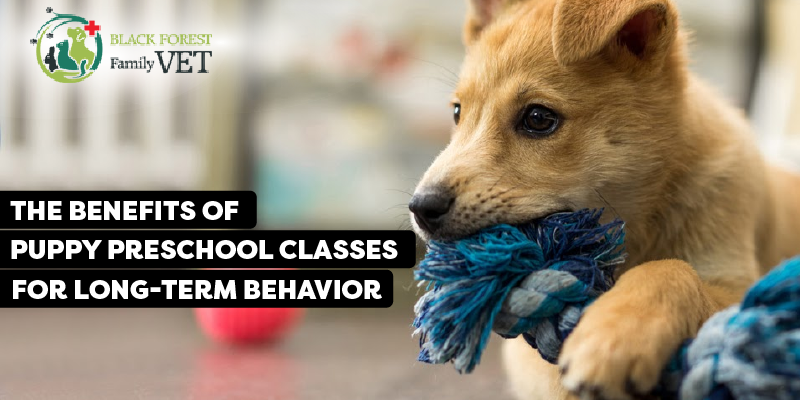The Benefits of Puppy Preschool Classes for Long-Term Behavior

Bringing a puppy into your home is fun, but it comes with responsibilities to shape their future behavior. That’s why early puppy training is crucial for tailoring your puppy with a lifetime of good behavior and skills. It benefits a structured environment that helps puppies develop the skills needed to become well-behaved dogs.
Puppies are like children; they undergo crucial development stages where early experience influences their future activities. Just as a child’s education needs shape a puppy’s behavior and versatility, early training shapes its behavior and versatility. These early training sessions offer multiple benefits that extend the initial learning phase. Understanding the proper reasons why early training is needed is essential.
Here’s why early training is so vital:
- Socialization Period
Between 4 and 12 weeks of age, puppies undergo a challenging socialization period. During this phase, they are mainly responsive to new experiences and connections. Positive behavior during this phase can lead to an adjusted and confident adult dog, whereas negative socialization can result in behavioral issues such as fearfulness or anxiety. Preschool puppy socialization classes provide controlled environments and behavior. Whereas they can safely communicate with other dogs and people, it helps to develop social and cognitive skills.
- Obedience
Early Obedience Training is necessary to establish a strong foundation for good behavior. When puppies are young, teaching them commands like “sit,” “stop,” “come,” etc., is essential, as they are eager to learn new things at this age. As they grow, these behaviors are established within them. Early training sessions help create more advanced obedience and problem-solving skills, ensuring your puppy grows as a well-behaved adult dog.
- Behavioral Problems
There is a chance that many standard behavioral issues, including chewing or excessive barking, arise from a lack of proper training and socialization. Puppy preschool classes hail these potential problems by teaching puppies how to behave appropriately and providing them with the tools to manage their energy in practical ways. These habits will continue if you do not solve them on time; correcting them later is difficult.
Advantages of Puppy Preschool Classes
To address the needs of young puppies and their owners, puppy preschool classes are specifically designed. Here are some puppy preschool advantages of enrolling your puppy in a preschool class:
- Efficiency of Early Socialization
Puppy preschool offers well-structured socialization opportunities, which allow your puppy to communicate with other puppies in a controlled way. This communication or positive attitude helps puppies learn how to communicate and play suitably with their furry buddies. Exposure to different incentives, including various people and sounds, helps puppies become more manageable and fearful of new experiences.
- Structured Learning Curriculum
Preschool classes provide a structured curriculum for a learning environment where puppies can benefit from regular training from experienced instructors. The well-structured format helps puppies learn essential skills while allowing owners to develop efficient training techniques. This structure is both practical and enjoyable for your puppies.
- Bonding
Preschool classes offer valuable bonding time between you and your puppy. Training classes provide opportunities for positive communication, strengthening your relationship, and building confidence. Bonding is necessary with your pet to enhance their cognition behavior.
- Exposure to New Experiences
These classes show puppies various new experiences in a positive manner. This exposure is needed to help puppies become more comfortable and confident in multiple situations, reducing the habit of fear reactions or anxiety in the future. Puppies learn how to sound and handle new environments to contribute to their overall flexibility.
Long-Term Benefits of Early Training
The benefits of early puppy training extend to the preschool phase. Let’s know how early training contributes to long-term behavior improvement:
- Reduced Risk of Behavioral Issues
Early training helps to prevent the development of behavioral issues like fearfulness and anxiety. By knowing these issues earlier, you can reduce the risk of chronic problems that require more intense intermediation later. A well-socialized puppy has less chance of developing any behavioral issues as they lead to a peaceful relationship with the properly behaved dog. - Better Adaptability
Puppies learn how to handle new experiences with ease, which makes them more comfortable in various situations. This flexibility and confidence provide a well-balanced adult dog capable of handling changes and challenges with ease. - Easier Integration
A trained puppy is easy to incorporate into daily life in various social settings. Good behavior makes activities such as walking or interacting with other pets. This enhances your puppy’s quality of life by ensuring their positive interaction.
Conclusion
Enroll your puppy in preschool classes to preventing puppy behavior issues. It is necessary to know the information about why a pet owner should join their pet in preschool classes and what are the benefits of joining them. If you’re looking to provide your puppy with the best life, consider enrolling them in a puppy preschool class and access the long-term benefits of early training.
For more information on puppy preschool classes, contact Black Forest Family Vet to join in early training and investment in a bright and cheerful future for both you and your puppy.